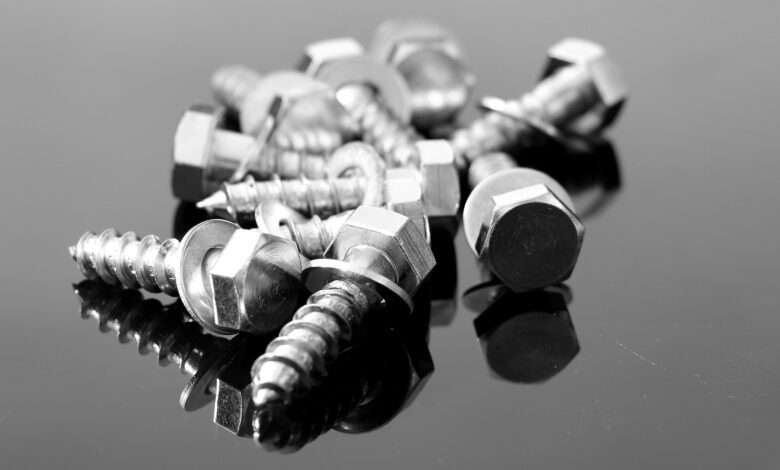Choosing the Right Machine Screw for Your Project : A Complete Guide

When it comes to assembling or securing materials for a project, Choosing the Right Machine Screw for Your Project is essential for ensuring stability, strength, and durability. Whether you’re building furniture, assembling machinery, or working on DIY projects, the type of screw you select can make a big difference in the outcome of your work. With countless options available, it can be challenging to know where to start. In this comprehensive guide, we will walk you through the different types of machine screws, key considerations for choosing the right one, and practical tips to ensure the best fit for your specific needs.
This guide is prepared by the editorial team at V Aiotechnical.com, bringing you expert insights to make informed decisions when choosing the right machine screw for your project.
Understanding the Importance of Choosing the Right Machine Screw
Machine screws are designed for precision fastening, typically used to secure metal components together. Unlike wood screws or self-tapping screws, machine screws are meant to fit into pre-tapped holes in materials and are often paired with nuts or other fasteners. The right choice of machine screw can enhance the structural integrity of your project, while a poor choice could lead to weak connections or difficulty during assembly.
Choosing the correct screw requires a solid understanding of factors such as screw type, material, threading, and the specific application requirements. In this article, we’ll provide detailed guidance on how to make the best choice based on these factors.
Types of Machine Screws: Choosing the Right Machine Screw for Your Project
Machine screws come in various types, each designed for specific applications. By understanding these different types, you’ll be able to select the best option for your needs. Here’s a breakdown of the most common types of machine screws and their characteristics:
Pan Head Screws: A Versatile Option
One of the most common types of machine screws is the pan head screw. These screws have a rounded, slightly domed head that provides a wide contact area. This makes them ideal for applications where the screw needs to distribute pressure evenly across the material. Pan head screws are versatile and work well in electrical assemblies, general-purpose construction, and situations where a flat bearing surface is important.
Applications: Electrical assemblies, general construction, and applications requiring even pressure distribution.
Flat Head Screws: Choosing the Right Machine Screw for Your Project
Flat head screws feature a countersunk design, which allows the screw head to sit flush with the surface of the material when fully installed. This is particularly important in applications where a smooth, seamless finish is required. Flat head screws are frequently used in woodworking, furniture construction, and decorative projects, where aesthetics play a significant role.
Applications: Furniture, cabinetry, decorative items, and any project requiring a flush, smooth finish.
Round Head Screws: Durable and Reliable
For projects that require a stronger, more durable connection, choosing the right machine screw for your project are an excellent choice. With a higher profile, these screws provide increased strength, making them ideal for securing materials under moderate force. Round head screws are commonly used in woodworking and metalworking, where visibility of the screw isn’t a major concern, but durability and strength are crucial.
Applications: Woodworking, metalworking, and other heavy-duty applications.
Hex Head Screws: Best for High-Torque Applications
If your project requires a high level of torque for tightening, hex head screws are the best option. With their six-sided design, these screws can be easily tightened with a wrench or a socket tool, making them ideal for high-torque applications. Choosing the Right Machine Screw for Your Project are used in heavy-duty settings, including automotive, construction, and machinery assembly, where a secure and strong connection is essential.
Applications: Automotive assembly, construction, machinery, and other high-torque applications.
Phillips Head Screws: Choosing the Right Machine Screw for Your Project
For precise fastening in tight spaces, Phillips head screws are a top choice. The cross-shaped drive helps to prevent slipping during installation, providing greater control and reducing the risk of damaging the screw or material. These screws are ideal for applications that require precision and ease of alignment, such as electronics or light manufacturing.
Applications: Electronics, light manufacturing, and applications where precise alignment is essential.
Key Considerations When Choosing the Right Machine Screw for Your Project
1. Thread Type: Coarse vs. Fine Threads
The threading of a machine screw is one of the most important factors in ensuring a secure connection. There are two primary types of threads used in machine screws: coarse threads and fine threads. Understanding the differences between these options is crucial when choosing the right machine screw for your project.
- Coarse Threads: Coarse threads are best suited for softer materials like wood, plastic, or aluminum. These threads are deeper and wider, allowing for a more secure grip. They are easier to install and remove, making them ideal for general-purpose fastening.
- Fine Threads: Fine threads, on the other hand, are used for harder materials like steel or brass. They provide a tighter, more precise fit, which is ideal for applications that require greater strength and resistance to loosening.
2. Material: Choosing the Right Machine Screw for Your Project
Choosing the right machine screw for your project is essential for both strength and durability. Common materials include stainless steel, carbon steel, and brass.
- Stainless Steel: Highly resistant to corrosion, stainless steel is perfect for outdoor or marine applications where the screw will be exposed to moisture or harsh environmental conditions.
- Carbon Steel: Carbon steel is stronger and more affordable but is prone to corrosion. It is suitable for indoor applications and situations where the screw will not be exposed to moisture.
- Brass: Brass is used primarily for decorative or aesthetic applications. It has a gold-like appearance and is resistant to corrosion, making it ideal for projects requiring an attractive finish.
3. Length and Diameter
Machine screws come in various lengths and diameters, and the correct size depends on the thickness of the material you’re fastening and the depth of the pre-tapped hole. If the screw is too short, it may not provide a secure hold; if it’s too long, it may not sit properly in the material.
Always measure the thickness of your material and the depth of the tapped hole to select the correct length and diameter.
Best Practices for Using Machine Screws
To ensure that your project is both secure and durable, follow these best practices when choosing the right machine screw for your project:
1. Use the Right Tools
Proper tools are essential for successful installation. Use the correct screwdriver, wrench, or socket based on the head design of your screw. For example, hex head screws require a wrench or socket tool for tightening, while Phillips head screws need a screwdriver with the correct size tip.
2. Pre-Tap Holes for Precision
Before installing machine screws, ensure that the holes are pre-tapped to the correct size and depth. This will make installation smoother and ensure a secure fit. Avoid over-tightening, as this can damage the threads or the material being fastened.
3. Consider Environmental Factors
When working on outdoor or harsh environment projects, choose machine screws that are specifically designed to resist corrosion. Stainless steel screws are highly recommended for projects exposed to moisture, while brass screws work well for applications where aesthetic appeal is a priority.
Conclusion: Choosing the Right Machine Screw for Your Project
In conclusion, selecting the right machine screw for your project is essential for ensuring both functionality and durability. Whether you need the versatility of pan head screws, the aesthetic finish of flat head screws, or the strength of hex head screws, understanding the characteristics and applications of each type will help you make an informed decision.
Always consider the material, threading, length, and environment when choosing the right machine screw for your project. With the right fasteners, your project will not only be secure but also stand the test of time.
This guide, prepared by the editorial team at V Aiotechnical.com, provides the insights you need to select the perfect machine screw for any task, ensuring your project is built to last.





